The IDEAL Programme comprises the largest studies of ‘living well’ with dementia in Great Britain. The evidence collected is supporting the development of new policy, interventions and initiatives to transform the lives of people with dementia and their carers.
Dr Cathy Charlwood reflects on the impact of, and reactions to, one of the research project’s creative outputs, a play about the experience of people living with and caring for people living with dementia.
A world ‘turned upside down’
In January 2022, the IDEAL dementia research programme staged a research-informed play, ‘The World Turned Upside Down’, for three performances in Exeter. Audiences were clearly moved, with feedback that it made people realise, “the importance of making time and space, helping to make collective decisions and maintaining an identity”, that “‘care’ is a word used too flippantly”, or “How easily you can judge from the outside without understanding personal circumstances”.
That September, we released a documentary film of the same name. This incorporated not only the performances, but the development process, rehearsal footage, and – crucially – the audiences’ reactions to what they saw. To date the film has been viewed over 3,900 times, receiving comments like, “your film evoked so many memories and events that are so familiar”.
An original audience member noted that, “the same action can be handled in lots of different ways with better or worse outcomes”, which is exactly what we sought to portray. Under the leadership of Director Paul Jepson, ‘The World Turned Upside Down’ used forum theatre techniques to explore how the reactions of the people surrounding a person living with dementia can improve or frustrate the situation: the play would stop and the audience asked about how they felt a particular scenario had gone. The actors would then improvise the scenario again with changed behaviours.
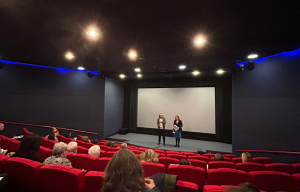
Professor Charles Musselwhite and I introducing the event.
On 24th January 2023, I co-facilitated a free public screening of the film in the cinema in Aberystwyth Arts Centre. Alongside Professor Charles Musselwhite from Aber’s psychology department and the Centre for Ageing & Dementia Research (CADR), we showed the film but also discussed it with the audience. We advertised in the local area, reaching out to health and third sector organisations as well as the general public. Council employees had an information stand about local support for carers as part of the event.
Seeing audience reactions
Although I saw all three performances of the play and watched the film several times as part of the editing process, this was my first moment of seeing an audience’s reactions. I was struck by the sense that many people had been waiting for the chance to say what they needed to say, and to be heard. This is always a double-edged sword: you feel grateful to have been able to afford that person the opportunity, but you also worry that there hasn’t been an opportunity before now.
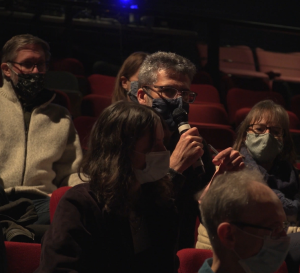
A theme which came out strongly from audience discussions was the effect of the pandemic. Within the world of research publications and funding, it is all too easy to think that the COVID-19 pandemic is now old news, but that isn’t true for you if conditions haven’t returned to what they were before. Many people lamented how previous services – which for them were a lifeline – had never reopened, or had transferred online/by phone and were staying that way.
The ‘caring for your mother’ scenario in the film (which gets harder over time) clearly resonated with the audience: we had a lot of discussion about the often untold toll that caring can take on someone and how little support is often available. There is a moment in the film where actor Steve Bennet speaks as himself, acknowledging that “It’s so easy to get frustrated” when caring and “I’m not the best person for it”. His honesty – and hearing him speak as fellow person rather than actor – was multiply commented on by the audience and seemed to unlock other people’s ability to reveal their own frustrations, difficulties and conflicts with caring in all its forms. I hadn’t previously seen this as a pivotal moment in the film, so it was fascinating to see it brought forth from the audience.
Reflecting on a deepening care crisis
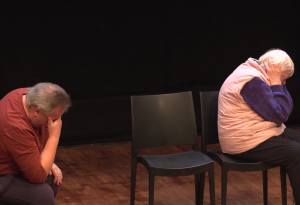
Actors Steve Bennett (L) and Gill Cree (R) portray a breaking point in the caring relationship between son and mother.
This screening also made me think about how changed the situation is from when we performed the play in January 2022. The Cost of Living Crisis is now in full flow and the care crisis has worsened. This time people were discussing the inability to get respite or care even if you were prepared to let yourself off the hook slightly.
As with any audience participation, it started tentatively and grew. However, with ‘The World Turned Upside Down’, audience participation is part of the film: I found that in the screening, the audience were reacting to the (previous) audiences’ reactions – the possibilities for discussion are built into the film itself! We asked our audience to write down how the event had changed how they thought about dementia.
Here are just a few responses:
“The audience debate increased my knowledge of the range of ways dementia can effect people, the different ways it manifests.”
“The film really brought home the effect that dementia has on the person who has it and their family. As someone whose parent is suffering from this, I think that the play showed the value of being able to share the caring and also to be able to talk about things.”
“Reinforced the need for funding in this area – many charities have collapsed since Covid and the need for support in this area is greater than ever.”
Why not stage your own screening?
As Dementia Action Week (15-21 May) and Carers Week (5-11 June) near, why not consider running your own screening of ‘The World Turned Upside Down’? The film and accompanying resources are free, and the screening described above has already inspired many people to run events in their own communities. Apart from hopefully some information and inspiration, ‘The World Turned Upside Down’ offers:
- a hook to hang ideas and thoughts on, and a focal point for people to gather around (it can be difficult to ‘mount’ an event on a difficult topic like dementia)
- people being honest about their own stories, and thus giving viewers permission to acknowledge, and perhaps share, theirs
The world of research, of universities, can sometimes feel closeted and one step removed from real lives. Being able to share experiences with people and to offer the opportunity to express what dementia is, means, and does for them is an immense privilege.
Running a screening
Things to consider for your screening:
- Who can you team up with? This might be a venue who can help you host, or a local university or charity partner who might help with answering audience questions. Even if they can’t attend, if you can get leaflets and information about local services or groups to have available, it can really help.
- Where will you direct people to? One-off events like a screening can be an invaluable beginning, but a beginning is all they are. If someone has psyched themselves up to attend and perhaps speak about dementia for the first time, they need the option of continuing that unburdening. Ensure that you link the audience to local support (if available) or to national charities like Alzheimer’s Society and Dementia UK, or free resources like the Living with Dementia Toolkit.
Related publications

Impact of COVID-19 on ‘Living Well’ with Mild-to-Moderate Dementia in the Community: Findings from the IDEAL Cohort
Read the publication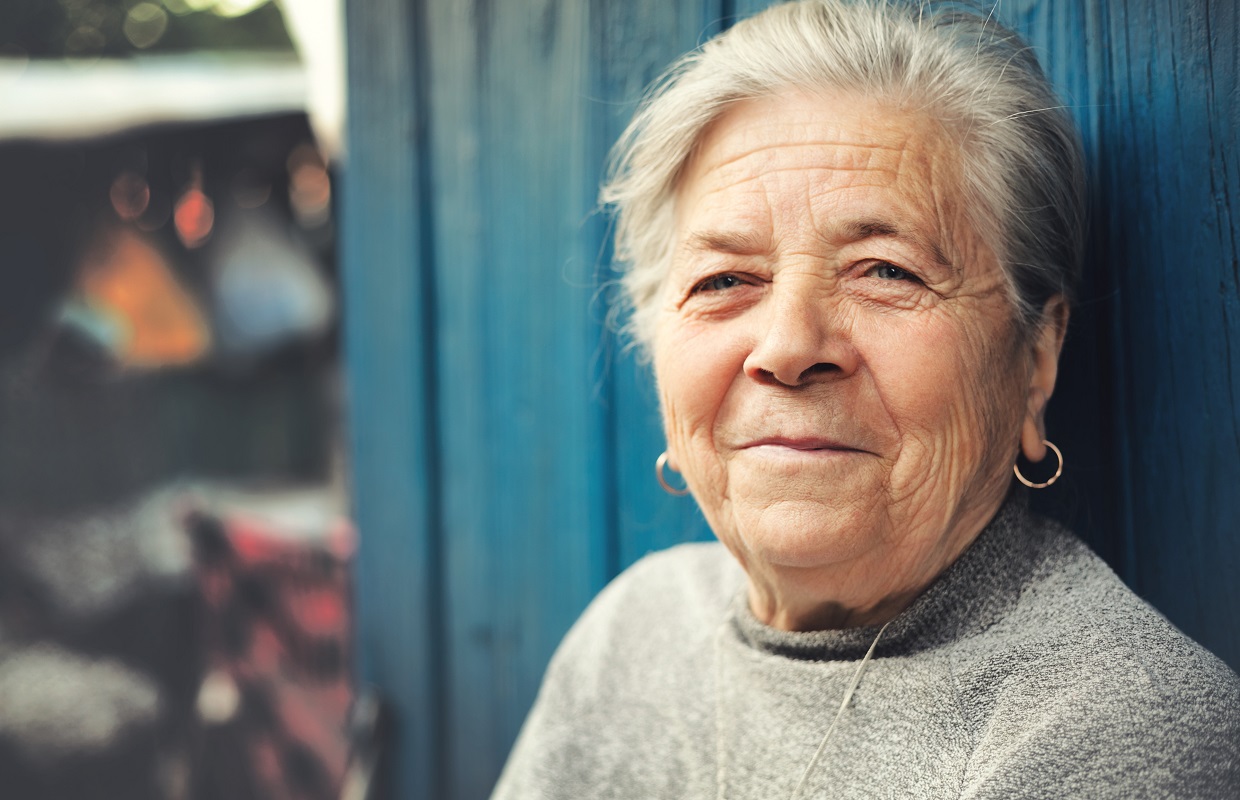
Living with dementia during the COVID-19 pandemic: coping and support needs of community-dwelling people with dementia and their family carers. Research findings from the IDEAL COVID-19 Dementia Initiative (IDEAL-CDI). Older People and Frailty Policy Research Group
Read the publication
Living with dementia under COVID-19 restrictions: coping and support needs among people with dementia and carers from the IDEAL cohort
Read the publication
Methods and approaches for enhancing communication with people with moderate-to-severe dementia that can facilitate their inclusion in research and service evaluation: Findings from the IDEAL programme
Read the publication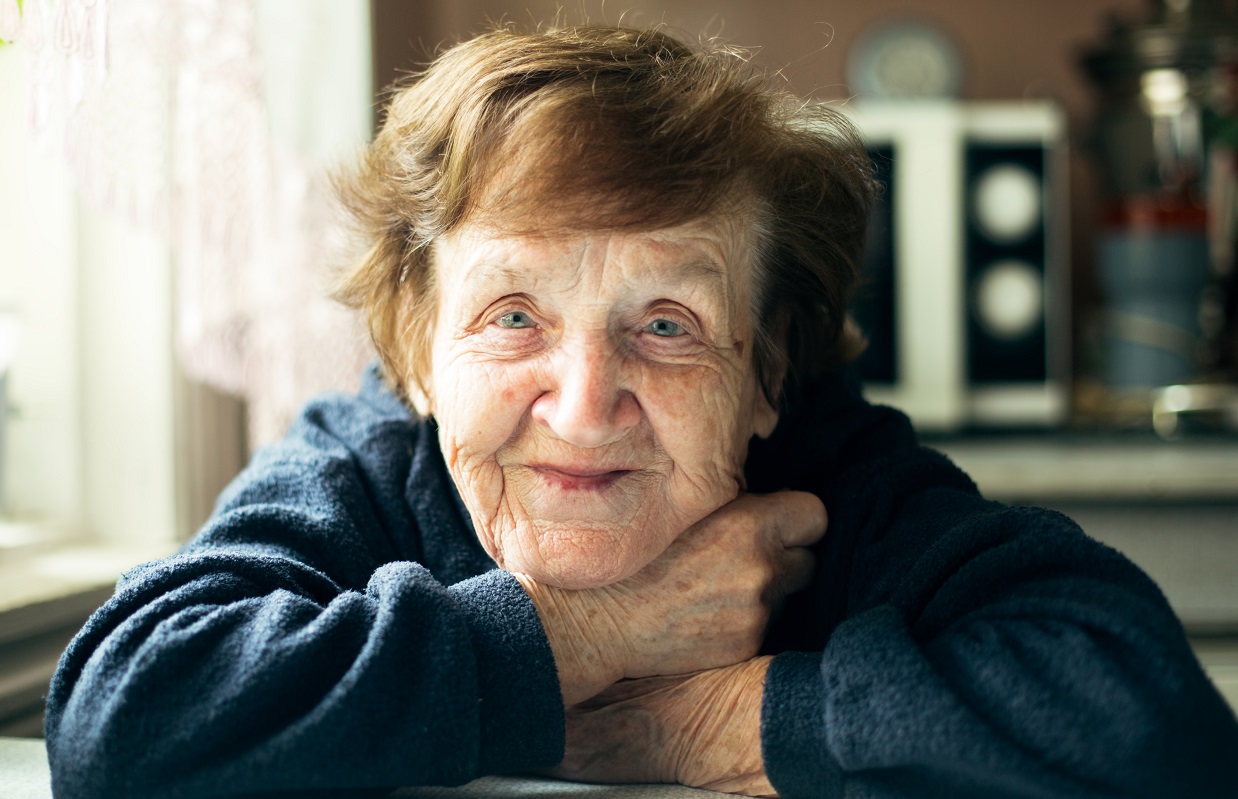
REPORT: Living with dementia during the COVID-19 pandemic: coping and support needs of community-dwelling people with dementia and their family carers. Research findings from the IDEAL COVID-19 Dementia Initiative (IDEAL-CDI)
Read the publicationAuthor
Dr Catherine Charlwood
About the authors
Dr Catherine Charlwood is Research Translation and Impact Manager on the IDEAL project at the University of Exeter.
Catherine is committed to finding new ways for research to reach a wider public. As Research Translation and Impact Manager for the IDEAL project, she seeks to share the many findings of this important study with the varied stakeholder audiences who stand to benefit. As a former teacher, Catherine is particularly interested in bringing research impact to school students and teachers.
Learn more about Catherine on her University of Exeter profile.
